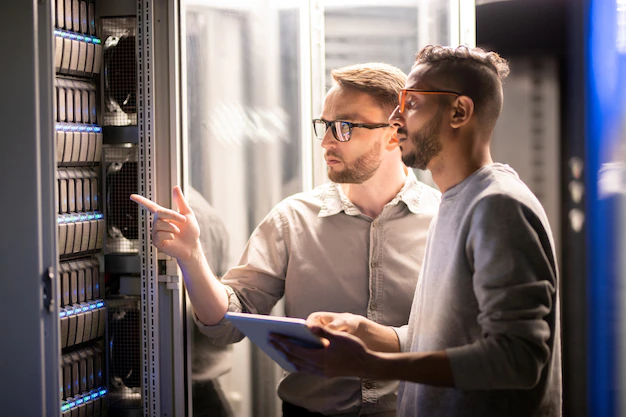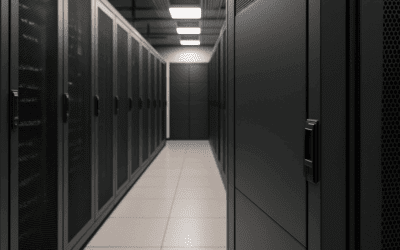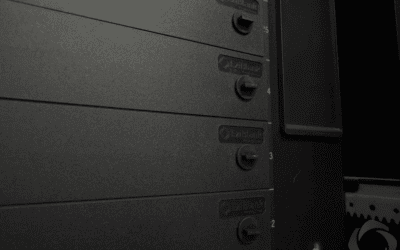Everything you need to know about a Server Room
If you are going to be setting up a data center, you will have probably spent a lot of time thinking about the design, the cooling, and many of the other intricate details of your facility.
So it would be no surprise that you need to find suitable storage for your servers.
But did you know that they should be kept in their own room, separate from the other equipment?
We know what you’re thinking.
Do my servers REALLY need a whole room to themselves?
And the answer is yes!
Your servers belong in a server room, which is a vital part of any business using this kind of equipment.
But before we get into too much detail about server rooms, let’s just begin with the basics.
A server room is a specially designed room in which servers and other equipment is housed.
They play a crucial role within a data center, yet many people feel as though they don’t know much about them.
In this article, we will discuss the purpose of server rooms, including the different types of servers, design considerations and even, how to maintain your server room.
By the time you are finished reading, you will have an idea of everything you need to know about server rooms.
The purpose of server rooms
First and foremost, the primary purpose of a server room is to house computer and technical equipment.
However, there are a number of other purposes that server rooms can have.
Other purposes include:
- For data backup and storage
- For network operations and management
If the primary infrastructure of a business is damaged or destroyed, the servers in the server room can be brought online to keep the business running.
Different types of servers
There are a variety of different types of computer servers that can be found in a server room.
These servers work together to provide essential services to businesses and organizations.
- File servers are used to store files and share them with other computers on the network.
- Web servers are used to host websites. It runs software that allows people to access websites using their web browser.
- Email servers are used to store and send emails.. It typically has more storage capacity than a desktop computer.
- Database servers are used to store data for businesses and organizations. These can be used to store data for a single business, or it can be used to store data for multiple businesses.
- Application servers are used to run applications.
- Terminal servers are used to connect to remote computers.
What other computer equipment is kept in a server room?
Besides servers, server rooms contain a variety of other computer equipment:
Server racks
A server may be ordered in various sizes of units or in a server rack.
A small server room requires a minimum of 1 cabinet or rack whereas a bigger server installation requires more space to store storage and cages.
These racks have spots for the installation of servers.
Networking equipment
Network equipment should be stored in a secure storage unit inside a server room.
The kind of networking equipment that must be purchased is dependent upon the number of servers and the required level redundancy, among other things.
In a smaller server room combination router and firewalls may be available or a dedicated server is possible and larger server rooms always require dedicated routers.
Cable management solutions
Another important aspect of running a server room is keeping everything neatly organized.
This is where cable management solutions come in. These are systems used to organize the cables so that they are not a trip hazard.
Two of the most popular cable management solutions are:
- Cable ties which are small, plastic straps that can be used to attach cables together or to secure them to a cable management system. They are inexpensive and easy to use.
- Cable baskets which are metal or plastic baskets that can be attached to the wall or ceiling of a server room.
Design considerations
There are many considerations that are important when designing a server room:
Size and location of the server room
The size of a server room can vary depending on the amount of equipment that needs to be housed.
A small business may only need a few servers, while a large corporation may have hundreds of servers.
You can always estimate your needs and proceed accordingly.
Another consideration when designing a server room is the location of the room. The server room should be in a location that is:
- Secure – the server room should be in a location that is locked and inaccessible to unauthorized personnel
- Cool – the server room should be kept cool to prevent the servers from overheating
- Dry – the server room should be kept dry to prevent the servers from rusting or becoming damaged
Power
Don’t forget about the need for your server to work.
For best operations, a server room should use an Uninterruptible Power Supply or UPS.
This will also supply emergency electric power to servers at times of sudden power failure.
Cooling
Server room cooling is an important part of keeping your computer equipment running properly.
The servers and other equipment in a server room generate a lot of heat, and if it is not properly cooled, the equipment can overheat and fail.
One popular way of cooling a server room is to use air conditioning units.
Another way is to use liquid cooling systems. These systems circulate water or other liquids through the computer equipment, which helps to dissipate the heat.
Airflow
Besides having a good cooling system in place, good airflow management should also be considered.
The servers in a server room generate a lot of heat, and it is key that the server racks are spaced to allow for adequate airflow around each piece of equipment.
You can improve the airflow in a server room by installing fans or using other methods to move the air around.
Security
Server room security is another important concept. Equipment is often expensive and sensitive, so it’s important to keep it safe.
You should install security cameras to monitor the room and implement physical security measures such as door locks.
Additionally, all of the computer equipment should be locked in cabinets or racks to prevent theft.
Fire suppression
It’s important to have a fire suppression system in place for your server room in case of a fire emergency.
This protects the computer equipment from damage and keeps your business running safely and efficiently.
The most common types are a sprinkler system and gas extinguisher.
How to maintain your server room?
Maintaining your server room is important in order to keep your computer equipment running safely and efficiently.
There are a number of things you can do to maintain your server room:
Firstly, you should monitor the temperature and humidity levels in the server room. The servers in a server room can be sensitive to changes in climate, so it is important to make sure that the environment is maintained within acceptable levels.
You should also keep an eye on the dust levels in the server room. Dust can build up over time and can restrict air flow into the server room, which can lead to overheating. So it is important to clean up the servers on a regular basis to prevent this from happening.
Server rooms for smooth business operation
A server room is a designated space in your business where you house all of your company’s computer servers.
The size and layout of the server room can vary, but it is important to consider some of the key factors mentioned when designing or setting up this space.
In addition to having adequate power and cooling, you need to think about security, airflow, and fire suppression.
It is also important to maintain the server room on a regular basis by monitoring temperature, humidity, and dust levels.
By following these tips, you can help keep your computer equipment running safely and efficiently.
For more information on servers take a look at our information hub, where you can find out everything you need to know about data centers.




